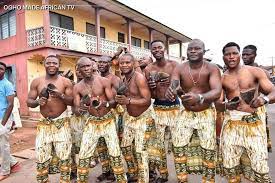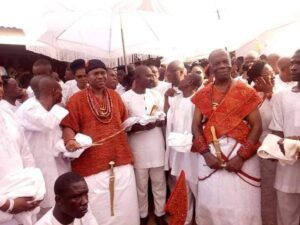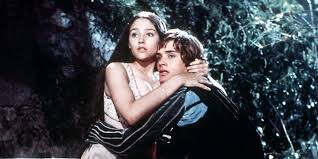The Igogo Festival is a traditional celebration observed by the people of Owo, a town in Ondo State, Nigeria.
It is an annual event that typically takes place during the second or third week of August. The festival is a
significant cultural and religious occasion for the Owo people, celebrating their history, heritage, and spirituality.
It is held annually in September to honor Queen Oronsen, a mythical wife of Rerengejen. During the festival,
the incumbent Olowo of Owo, Oba Ajibade Gbadegesin Ogunoye III, and high chiefs of Owo Kingdom dress like women with coral beads, beaded gowns, and plaited hair.
The wearing of headgear and caps as well as the beating of drums and firing of guns are forbidden during the festival.
Click here to see more tips: https://www.facebook.com/yorubablog/videos/igogo-festival/264922532022211/
A Glimpse into the Igogo Festival
The origins of the Igogo festival began over 600 years ago during the reign of Olowo Rerengejen.
The monarch married Oronsen, a queen who was, unknown to the king, an orisha. She enriched the monarch and she was loved by him as a result.
No one was allowed to grind okra (for stew) in her presence or pour water into the yard. She forbade people,
arriving from the farm, to dump, or throw down, a load of firewood in her presence.
King Rerengejen cautioned his other wives not to carry out any of these activities.
One day, Queen Oronsen disagreed with the other wives of the king.
They conspired against her to violate her taboos while Rerengejen was not in the palace.
As she was making her escape, some palace guards and chiefs pursued her, intending to return her to the palace,
an effort that was ultimately futile.
Becoming weary, she stopped at a place called “Ugbo Laja” where she was discovered and attempts were
made to persuade her to return to the palace. Her refusal frustrated the guards, who forcefully captured her. But she escaped them and disappeared into “Igbo Oluwa”, now a sacred forest,
leaving her head ties (oja) at Ugbo Laja. The guards later returned them to King Rerengejen. “Ugbo Laja” is now a sacred grove.
History
A terra-cotta sculptured image of Queen Oronsen was excavated from “Igbo Oluwa” by Ekpo Eyo (1931–2011),
a Nigerian scholar and anthropologist. Her “image” stood at a distance to inform the Owo people that she would never return to the palace but that annually they should always sacrifice two hundred items of different articles,
such as dried fish, coconut, alligator pepper, bitter cola and many more for the ritual (Igogo).
In return, she promised to protect the kingdom forever.
The Igogo Festival has its roots in the history of the Owo Kingdom, dating back centuries. It is believed to have originated as a way to honor and appease the deities and ancestors, seeking their blessings for the prosperity and well-being of the community.
Ceremonial
The Igogo festival lasts for 17 days and begins with Upeli proceedings by the Iloro chiefs. The chiefs are led
by a chief known as Akowa of Iloro, who is the traditional head of the Iloro chiefs. This Upeli procession lasts
for 12 days and features several activities including Utegi, Ugbabo, Uyanna, and Ugbate.
Moreover, During this procession, the beating of drums by individuals or associations is forbidden and
the use of caps by men and head ties by women at close range to the Owo monarch, the Olowo of Owo.
The festival features the dance of bare-chested men, the Iloro Quarter men called Ighares. They often wear
white caps with two horns of buffalo in their hands.
They strike these horns together while dancing around the town and visiting sacred places located in the town.
During this rite, any animal that crosses their paths will be viewed as food. The chiefs braid their hair and dance around the town, and visit their loved ones who give them gifts in return.
The monarch often dresses like a woman and dances around the town.
Central to the Igogo Festival is the ceremonial rites and rituals that pay homage to the divine forces believed to govern the lives of the Owo people.
Traditional priests and palace officials lead the proceedings, performing sacred rites, libations, and sacrifices to invoke the blessings of the gods. These rituals, steeped in symbolism and significance, serve to strengthen the spiritual bonds between the community and the supernatural realm.


Colorful Performances
A highlight of the Igogo Festival is the spectacular showcase of traditional performances that captivate the senses and ignite the spirit of revelry. Dancers adorned in vibrant attire move to the rhythmic beats of drums and chants, their movements echoing ancient tales and ancestral wisdom. Masquerades, intricately crafted and imbued with symbolic meaning, take center stage, embodying the spirits of the ancestors and deities.
Culture Showcase
Beyond the rituals and performances, the Igogo Festival is a celebration of Owo’s rich cultural tapestry. Artisans and craftsmen display their talents through traditional crafts, showcasing exquisite beadwork, weaving, pottery, and more. Mouthwatering delicacies tantalize the taste buds of festival-goers, offering a culinary journey through Owo’s gastronomic heritage.
Community Unity and Pride
The Igogo Festival serves as a unifying force, bringing together people from all walks of life to celebrate their
shared identity and heritage.
It is a time for families to reunite, friends to reconnect, and visitors to experience the warmth and hospitality
of the Owo community. Through shared experiences and collective celebrations, the festival strengthens
social bonds and instills a sense of pride in Owo’s cultural legacy.
The festival brings together people from all walks of life, fostering a sense of community unity and solidarity.
It is a time for families to reunite, friends to reconnect, and visitors to experience the warmth and hospitality
of the Owo community. Through shared experiences and collective celebrations, the Igogo Festival strengthens
social bonds and reinforces cultural identity.
Preserving Tradition
In the face of modernization and cultural change, efforts are underway to preserve and promote the Igogo Festival
as a cherished aspect of Owo’s cultural heritage. Local authorities, cultural organizations, and community
leaders are working tirelessly to ensure the continuity of the festival and its traditions, recognizing its
importance in safeguarding the identity and heritage of the Owo people for generations to come.
Local authorities, cultural organizations, and community leaders work together to ensure the continuity
of the festival and its traditions, recognizing its importance in preserving the identity and heritage
of the Owo people for future generations.
The Igogo Festival stands as a testament to the rich cultural tapestry of the Owo people, encapsulating
their history, spirituality, and community values. As the annual celebrations continue to thrive, the festival
remains a vibrant expression of Owo’s cultural pride and heritage, serving as a symbol of resilience,
unity, and tradition.
As the drums fade and the echoes of chants linger in the air, the Igogo Festival leaves an indelible mark
on the hearts and minds of all who experience its magic.
Through its rich tapestry of rituals, performances, and cultural expressions, the festival stands as a
vibrant celebration of tradition, unity, and pride, reaffirming the timeless spirit of the Owo people
and their enduring legacy.
Planning to attend the Igue Festival? make sure you book your accommodation in advance, be sure to check
the festival schedule and local events calendar.
At the time of the event, it becomes crowded. Don’t forget to bring your camera to capture the vibrant
atmosphere and take beautiful pictures, and your phone to take amazing videos and unforgettable moments and experiences.
It’s an event that will leave you with a deep appreciation for the country’s cultural diversity
Read More: https://placesandlifestyle.com/the-ojude-oba-festival-celebrating-culture-and-tradition/




